May 2014 Year Pope's Intentions Universal: That the media may be instruments in the service of truth and peace.Plastered up on my Church: "Freedom of religion is human right"
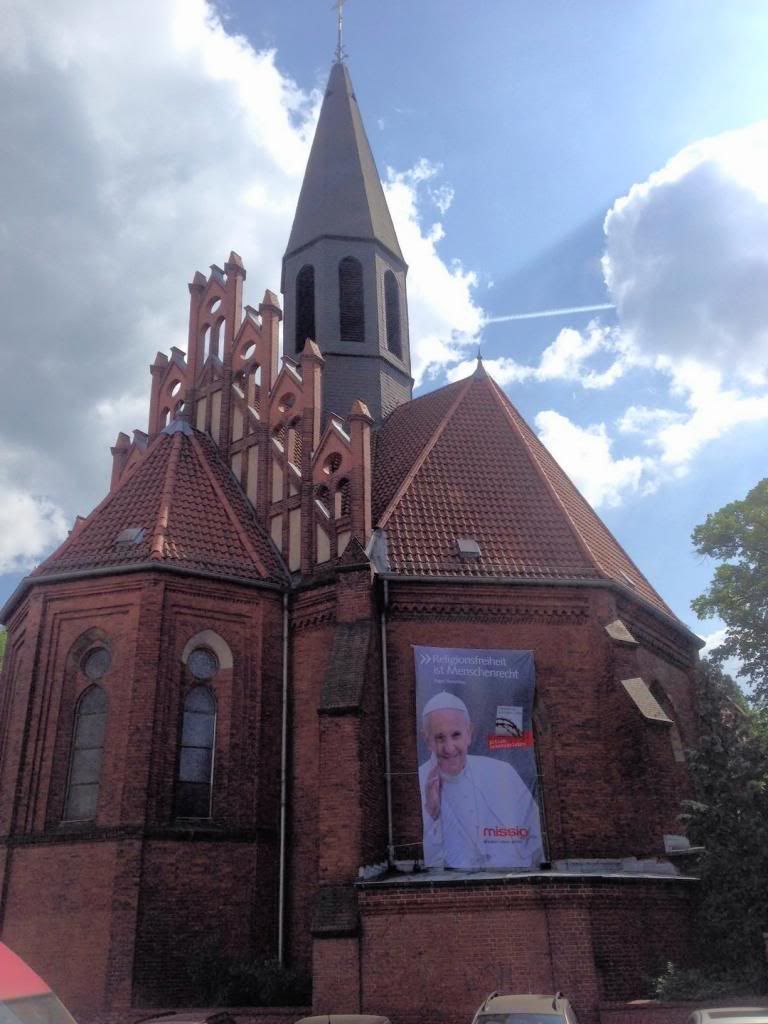
Posted on 05/01/2014 9:29:34 PM PDT by Salvation
This prayer, which dates from the twelfth century, is substituted for the Angelus during Easter Season.
In Latin |
In English |
|
Regina coeli, laetare, alleluia: Quia quem meruisti portare, alleluia. Resurrexit sicut dixit, alleluia. Ora pro nobis Deum, alleluia.
V. Gaude et laetare, Virgo Maria, Alleluia, R. Quia surrexit Dominus vere, alleluia.
Oremus: Deus qui per resurrectionem Filii tui, Domini nostri Iesu Christi, mundum laetificare dignatus es: praesta, quaesumus, ut per eius Genetricem Virginem Mariam, perpetuae capiamus gaudia vitae. Per eundem Christum Dominum nostrum. R. Amen. |
Queen of Heaven rejoice, alleluia: For He whom you merited to bear, alleluia, Has risen as He said, alleluia. Pray for us to God, alleluia.
V. Rejoice and be glad, O Virgin Mary, alleluia. R. Because the Lord is truly risen, alleluia.
Let us pray: O God, who by the Resurrection of Thy Son, our Lord Jesus Christ, granted joy to the whole world: grant we beseech Thee, that through the intercession of the Virgin Mary, His Mother, we may lay hold of the joys of eternal life. Through the same Christ our Lord. R. Amen. |
May 2014 Year Pope's Intentions Universal: That the media may be instruments in the service of truth and peace.Plastered up on my Church: "Freedom of religion is human right"

Good action!
Saint Athanasius,
Bishop and Doctor of the Church

Unknown artist
History
Saint Athanasius was the greatest champion of Catholic belief on the subject of the Incarnation that the Church has ever known and in his lifetime earned the characteristic title of "Father of Orthodoxy", by which he has been distinguished every since.
(Principal source - Catholic Encyclopedia - 1913 edition)
Prayer to Mary, Mother of Grace
It becomes you to be mindful of us, as you stand near Him who granted you all graces, for you are the Mother of God and our Queen. Help us for the sake of the King, the Lord God and Master who was born of you. For this reason, you are called full of grace. Remember us, most holy Virgin, and bestow on us gifts from the riches of your graces, Virgin full of graces.
St Athanasius, Bishop and Doctor
First Reading: 1 John 5:1-5
Every one who believes that Jesus is the Christ is a child of God, and every one who loves the parent loves the child. By this we know that we love the children of God, when we love God and obey His commandments. For this is the love of God, that we keep His commandments. And His commandments are not burdensome. For whatever is born of God overcomes the world; and this is the victory that overcomes the world, our faith. Who is it that overcomes the world but he who believes that Jesus is the Son of God?
Gospel Reading: Matthew 10:22-25
You will be hated by all for My name's sake. But he who endures to the end will be saved. When they persecute you in one town, flee to the next; for truly, I say to you, you will not have gone through all the towns of Israel, before the Son of man comes.
"A disciple is not above his teacher, nor a servant above his master; it is enough for the disciple to be like his teacher, and the servant like his master. If they have called the master of the house Be-elzebul, how much more will they malign those of his household.
Related links on the Vatican website: Benedict XVI, General Audience, Paul VI Audience Hall, Wednesday, June 20, 2007, Saint Athanasius of Alexandria
Related links on the New Advent website:
Saint Athanasius writings:
- Against the Heathen
- On the Incarnation of the Word
- Deposition of Arius
- Statement of Faith
- On Luke 10:22 (Matthew 11:27)
- Encyclical Letter
- Apologia Contra Arianos
- De Decretis
- De Sententia Dionysii
- Vita S. Antoni (Life of St. Anthony)
- Ad Episcopus Aegypti et Libyae
- Apologia ad Constantium
- Apologia de Fuga
- Historia Arianorum
- Four Discourses Against the Arians
- De Synodis
- Tomus ad Antiochenos
- Ad Afros Epistola Synodica
- Historia Acephala
- Letters

The best, the surest , and the most effective way of establishing everlasting peace on the face of the earth is through the great power of perpetual adoration of the Blessed Sacrament." -- Pope John Paul II

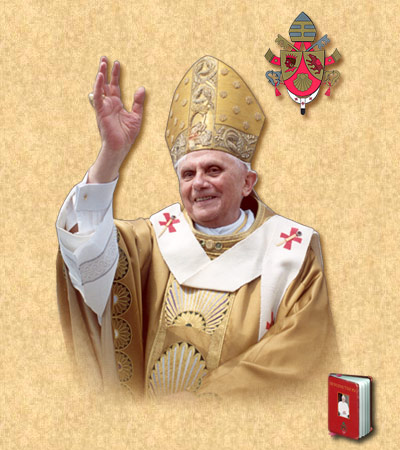

“The Pope has a great spiritual sense of worship and [importance of] reaching out to every human being,” says Msgr. Fazio. “In Buenos Aires in recent years, he has spontaneously promoted the exposition of the Blessed Sacrament in parishes, and it is bearing spiritual fruit.” Furthermore, Msgr. Fazio is sure the Pope will “pay particular attention to Eucharistic adoration and the preaching of the word.”
Perpetual Eucharistic adoration begins at the Olympics
With Eyes Wide Open -- Encountering the Lord in Adoration [Catholic Caucus]
Reasons for Perpetual Eucharistic Adoration(Catholic Caucus)
'We Are a Church On Fire': Eucharistic Adoration Transforms Acushnet Parish
Eucharistic Adoration [for college students nationwide]
Pray Unceasingly: Perpetual Adoration as a Necessary Antidote to Abortion
[CATHOLIC CAUCUS] There is water here (Eucharistic Adoration)
Eucharistic Adoration is Life Changing
Here is Christ! (Daily Holy Hour) [Catholic Caucus]
Letter to a Brother Priest [on Eucharistic adoration]
ND’s McBrien: Eucharistic Adoration “is a...spiritual step backward” (Catholic Caucus)
Adoration with no end: 24-hour Eucharistic ritual returns to Boston [Catholic Caucus]
Kansas parish opens adoration chapel
Perpetual adoration returns to Boston after 40 year absence [Catholic Caucus]
I Fall To My Knees (A Reflection on Eucharistic Adoration)
A Chinese Girl-True Story That Inspired Bishop Fulton Sheen- Eucharist Adoration (Catholic Caucus)
Eucharistic Adoration increases prayer, vocations in Uganda(Catholic Caucus)
Faithful Invited to Follow Pope, Adore Eucharist [Catholic Caucus]
Catholic Caucus: The Hour That Makes My Day | Archbishop Fulton J. Sheen
A Shepherd Speaks (Eucharistic Adoration) -- Bishop Edward J. Slattery [Catholic Caucus]
Why Eucharistic Adoration?(Catholic/Orthodox Caucus)
The Core of Monasticism Is Adoration [Catholic Caucus](Homily of Pope Benedict XVI on Sunday
Perpetual Eucharistic Adoration: a Parish's Fuel
The History of Eucharistic Adoration Development of Doctrine in the Catholic Church
The Cease-Fire of Prayer and Fasting
Eucharistic Adoration: The Early Years
Catholic Meditation and Devotion: The Holy Hour
Spend Some Time With Jesus Tonight...
The Eucharistic Mystery Calls For Our Response
Pope Backs Perpetual Eucharistic Adoration
Eucharistic adoration is key, but also has drawbacks, bishops say
Eucharistic adoration: Intimacy with Christ
The Gaze [Adoration of the Blessed Sacrament]
St. Francis of Assisi and Eucharistic Adoration
Ancient Roman Catholic ritual making a comeback in Minnesota
Adoration for Vocations to be Promoted Worldwide
POPE GRANTS PLENARY INDULGENCE FOR YEAR OF THE EUCHARIST
New Plenary Indulgence to Mark Year of the Eucharist
The Adoration of the Name of Jesus (El Greco)
Adoration Tally Presented to Pope by Vocation.com
In The Presence Of The Lord
2.2 Million hours of prayer, and counting
Eucharistic Adoration or Abortion?
Bishop Calls for Perpetual Adoration of Eucharist
What I learned about Eucharistic Adoration
PERPETUAL ADORATION
Feast Day: May 2
Born: 295 at Alexandria, Egypt
Died: 2 May 373 at Alexandria, Egypt
Major Shrine: Saint Mark Coptic Orthodox Cathedral in Cairo, Egypt
San Zaccaria, Venice, Italy
St. Athanasius
Feast Day: May 01
Born: (around) 297 :: Died: 373
Athanasius was born at Alexandria, in Egypt. He was very fond of reading books about the Catholic faith and studied the classics and theology at the university in Alexandria.
He became a deacon and secretary to Bishop Alexander of Alexandria, then later a priest. At that time the Arians did not believe that Jesus was God and tried to spread these false teachings. Athanasius attended the council of Nicea, fought against these teachings and got the council to accept the Nicene Creed. He spent his life proving that Jesus is truly God.
This saint became the archbishop of Alexandria when he was not yet thirty years old. For forty-six years, he was a good and brave shepherd of his flock. Four Roman emperors tried but failed to make him stop writing his clear and beautiful explanations of our holy faith.
His enemies did every thing they could to make him suffer. Five times he was sent away from Alexandria. Once, when he was sent to the city of Trier a kind bishop, St. Maximinius, welcomed him warmly.
At other times Athanasius was hunted by people who wanted to kill him. He was kept safe in the desert by some monks for seven years and his enemies just could not find him.
Once when the emperor's soldiers were chasing Athanasius down the Nile River, his friends began to panic as the soldiers began to catch up with them. But Athanasius was not worried. "Turn the boat around," he said calmly, "and row toward them." The soldiers in the other boat shouted, "Have you seen Athanasius?" "You are not far from him!" was the reply. The enemy boat quickly went past them, and the saint was safe!
The people of Alexandria loved St. Athanasius. He was a real father to them. As the years passed, they appreciated more and more how much he had suffered for Jesus and the Church.
Now the people made sure that Athanasius was protected and had some well-deserved peace. He spent the last seven years of his life safe with them. His enemies hunted but could never find him.
During that time, St. Athanasius wrote The Life of St. Anthony the Hermit who had been a close friend when Athanasius was young. St. Athanasius died quietly on May 2, 373. He remains one of the greatest, bravest saints of all time.
Friday, May 2
Liturgical Color: White
Today is the Memorial of St.
Athanasius, bishop and Doctor
of the Church. In 325 A.D.,
St. Athanasius attended the
Council of Nicea helping to
formulate the doctrine stating
Jesus was divine and not a
creation of God the Father.
|
|
Who can be confirmed, and what is required of a candidate for Confirmation?
Any Catholic Christian who has received the sacrament of Baptism and is in the "state of grace" can be admitted to Confirmation.
To be "in the state of grace" means not to have committed any serious sin (mortal sin). By a serious sin a person separates himself from God and can be reconciled with God only by making a good confession. A (young) Christian who is preparing for Confirmation finds himself in one of the most important phases of his life. He will do everything possible to grasp the faith with his heart and his understanding; he will pray alone and with others for the Holy Spirit; he will reconcile himself in every way with himself, with the people around him, and with God. Confession is part of this, since it brings one closer to God even if one has not committed a mortal sin.
Who may confirm?
The Sacrament of Confirmation is normally administered by the bishop. For weighty reasons when necessary, the bishop can also delegate a priest to do it. In danger of death, any priest can administer Confirmation. (YOUCAT questions 206-207)
Dig Deeper: CCC section (1306-1314) and other references here.
Part 2: The Celebration of the Christian Mystery (1066 - 1690)
Section 2: The Seven Sacraments of the Church (1210 - 1690)
Chapter 1: The Sacraments of Christian Initiation (1212 - 1419)
Article 2: The Sacrament of Confirmation (1285 - 1321)
IV. WHO CAN RECEIVE THIS SACRAMENT? ⇡
Every baptized person not yet confirmed can and should receive the sacrament of Confirmation.123 Since Baptism, Confirmation, and Eucharist form a unity, it follows that "the faithful are obliged to receive this sacrament at the appropriate time,"124 for without Confirmation and Eucharist, Baptism is certainly valid and efficacious, but Christian initiation remains incomplete.
123.
Cf. CIC, can. 889 § 1.
124.
CIC, can. 890.
For centuries, Latin custom has indicated "the age of discretion" as the reference point for receiving Confirmation. But in danger of death children should be confirmed even if they have not yet attained the age of discretion.125
125.
Cf. CIC, cann. 891; 883, 3o.
Although Confirmation is sometimes called the "sacrament of Christian maturity," we must not confuse adult faith with the adult age of natural growth, nor forget that the baptismal grace is a grace of free, unmerited election and does not need "ratification" to become effective. St. Thomas reminds us of this: Age of body does not determine age of soul. Even in childhood man can attain spiritual maturity: as the book of Wisdom says: "For old age is not honored for length of time, or measured by number of years. "Many children, through the strength of the Holy Spirit they have received, have bravely fought for Christ even to the shedding of their blood.126
126.
St. Thomas Aquinas, STh III,72,8, ad 2; Cf. Wis 4:8.
Preparation for Confirmation should aim at leading the Christian toward a more intimate union with Christ and a more lively familiarity with the Holy Spirit — his actions, his gifts, and his biddings — in order to be more capable of assuming the apostolic responsibilities of Christian life. To this end catechesis for Confirmation should strive to awaken a sense of belonging to the Church of Jesus Christ, the universal Church as well as the parish community. The latter bears special responsibility for the preparation of confirmands.127
127.
Cf. OC Introduction 3.
To receive Confirmation one must be in a state of grace. One should receive the sacrament of Penance in order to be cleansed for the gift of the Holy Spirit. More intense prayer should prepare one to receive the strength and graces of the Holy Spirit with docility and readiness to act.128
128.
Cf. Acts 1:14.
Candidates for Confirmation, as for Baptism, fittingly seek the spiritual help of a sponsor. To emphasize the unity of the two sacraments, it is appropriate that this be one of the baptismal godparents.129
129.
Cf. OC Introduction 5; 6; CIC, Can. 893 §§ 1-2.
V. THE MINISTER OF CONFIRMATION ⇡
The original minister of Confirmation is the bishop.130
In the East, ordinarily the priest who baptizes also immediately confers Confirmation in one and the same celebration. But he does so with sacred chrism consecrated by the patriarch or the bishop, thus expressing the apostolic unity of the Church whose bonds are strengthened by the sacrament of Confirmation. In the Latin Church, the same discipline applies to the Baptism of adults or to the reception into full communion with the Church of a person baptized in another Christian community that does not have valid Confirmation.131
130.
Cf. LG 26.
131.
Cf. CIC, Can. 883 § 2.
In the Latin Rite, the ordinary minister of Confirmation is the bishop.132 If the need arises, the bishop may grant the faculty of administering Confirmation to priests,133 although it is fitting that he confer it himself, mindful that the celebration of Confirmation has been temporally separated from Baptism for this reason. Bishops are the successors of the apostles. They have received the fullness of the sacrament of Holy Orders. The administration of this sacrament by them demonstrates clearly that its effect is to unite those who receive it more closely to the Church, to her apostolic origins, and to her mission of bearing witness to Christ.
132.
Cf. CIC, Can. 882.
133.
Cf. CIC, Can. 884 § 2.
If a Christian is in danger of death, any priest can give him Confirmation.134 Indeed the Church desires that none of her children, even the youngest, should depart this world without having been perfected by the Holy Spirit with the gift of Christ's fullness.
| John | |||
| English: Douay-Rheims | Latin: Vulgata Clementina | Greek NT: Byzantine/Majority Text (2000) | |
| John 6 |
|||
| 1. | AFTER these things Jesus went over the sea of Galilee, which is that of Tiberias. | Post hæc abiit Jesus trans mare Galilææ, quod est Tiberiadis : | μετα ταυτα απηλθεν ο ιησους περαν της θαλασσης της γαλιλαιας της τιβεριαδος |
| 2. | And a great multitude followed him, because they saw the miracles which he did on them that were diseased. | et sequebatur eum multitudo magna, quia videbant signa quæ faciebat super his qui infirmabantur. | και ηκολουθει αυτω οχλος πολυς οτι εωρων αυτου τα σημεια α εποιει επι των ασθενουντων |
| 3. | Jesus therefore went up into a mountain, and there he sat with his disciples. | Subiit ergo in montem Jesus et ibi sedebat cum discipulis suis. | ανηλθεν δε εις το ορος ο ιησους και εκει εκαθητο μετα των μαθητων αυτου |
| 4. | Now the pasch, the festival day of the Jews, was near at hand. | Erat autem proximum Pascha dies festus Judæorum. | ην δε εγγυς το πασχα η εορτη των ιουδαιων |
| 5. | When Jesus therefore had lifted up his eyes, and seen that a very great multitude cometh to him, he said to Philip: Whence shall we buy bread, that these may eat? | Cum sublevasset ergo oculos Jesus, et vidisset quia multitudo maxima venit ad eum, dixit ad Philippum : Unde ememus panes, ut manducent hi ? | επαρας ουν ο ιησους τους οφθαλμους και θεασαμενος οτι πολυς οχλος ερχεται προς αυτον λεγει προς τον φιλιππον ποθεν αγορασομεν αρτους ινα φαγωσιν ουτοι |
| 6. | And this he said to try him; for he himself knew what he would do. | Hoc autem dicebat tentans eum : ipse enim sciebat quid esset facturus. | τουτο δε ελεγεν πειραζων αυτον αυτος γαρ ηδει τι εμελλεν ποιειν |
| 7. | Philip answered him: Two hundred pennyworth of bread is not sufficient for them, that every one may take a little. | Respondit ei Philippus : Ducentorum denariorum panes non sufficiunt eis, ut unusquisque modicum quid accipiat. | απεκριθη αυτω φιλιππος διακοσιων δηναριων αρτοι ουκ αρκουσιν αυτοις ινα εκαστος αυτων βραχυ τι λαβη |
| 8. | One of his disciples, Andrew, the brother of Simon Peter, saith to him: | Dicit ei unus ex discipulis ejus, Andreas, frater Simonis Petri : | λεγει αυτω εις εκ των μαθητων αυτου ανδρεας ο αδελφος σιμωνος πετρου |
| 9. | There is a boy here that hath five barley loaves, and two fishes; but what are these among so many? | Est puer unus hic qui habet quinque panes hordeaceos et duos pisces : sed hæc quid sunt inter tantos ? | εστιν παιδαριον εν ωδε ο εχει πεντε αρτους κριθινους και δυο οψαρια αλλα ταυτα τι εστιν εις τοσουτους |
| 10. | Then Jesus said: Make the men sit down. Now there was much grass in the place. The men therefore sat down, in number about five thousand. | Dixit ergo Jesus : Facite homines discumbere. Erat autem fœnum multum in loco. Discumberunt ergo viri, numero quasi quinque millia. | ειπεν δε ο ιησους ποιησατε τους ανθρωπους αναπεσειν ην δε χορτος πολυς εν τω τοπω ανεπεσον ουν οι ανδρες τον αριθμον ωσει πεντακισχιλιοι |
| 11. | And Jesus took the loaves: and when he had given thanks, he distributed to them that were set down. In like manner also of the fishes, as much as they would. | Accepit ergo Jesus panes : et cum gratias egisset, distribuit discumbentibus : similiter et ex piscibus quantum volebant. | ελαβεν δε τους αρτους ο ιησους και ευχαριστησας διεδωκεν τοις μαθηταις οι δε μαθηται τοις ανακειμενοις ομοιως και εκ των οψαριων οσον ηθελον |
| 12. | And when they were filled, he said to his disciples: Gather up the fragments that remain, lest they be lost. | Ut autem impleti sunt, dixit discipulis suis : Colligite quæ superaverunt fragmenta, ne pereant. | ως δε ενεπλησθησαν λεγει τοις μαθηταις αυτου συναγαγετε τα περισσευσαντα κλασματα ινα μη τι αποληται |
| 13. | They gathered up therefore, and filled twelve baskets with the fragments of the five barley loaves, which remained over and above to them that had eaten. | Collegerunt ergo, et impleverunt duodecim cophinos fragmentorum ex quinque panibus hordeaceis, quæ superfuerunt his qui manducaverant. | συνηγαγον ουν και εγεμισαν δωδεκα κοφινους κλασματων εκ των πεντε αρτων των κριθινων α επερισσευσεν τοις βεβρωκοσιν |
| 14. | Now those men, when they had seen what a miracle Jesus had done, said: This is of a truth the prophet, that is to come into the world. | Illi ergo homines cum vidissent quod Jesus fecerat signum, dicebant : Quia hic est vere propheta, qui venturus est in mundum. | οι ουν ανθρωποι ιδοντες ο εποιησεν σημειον ο ιησους ελεγον οτι ουτος εστιν αληθως ο προφητης ο ερχομενος εις τον κοσμον |
| 15. | Jesus therefore, when he knew that they would come to take him by force, and make him king, fled again into the mountain himself alone. | Jesus ergo cum cognovisset quia venturi essent ut raperent eum, et facerent eum regem, fugit iterum in montem ipse solus. | ιησους ουν γνους οτι μελλουσιν ερχεσθαι και αρπαζειν αυτον ινα ποιησωσιν αυτον βασιλεα ανεχωρησεν εις το ορος αυτος μονος |
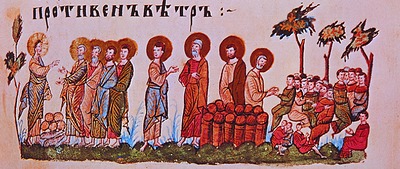
(The inscription in Old Slavonic, "contrary wind", is part of the text nearest to the illumination and refers to the next episode).
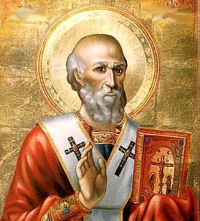
Daily Readings for:May 02, 2014
(Readings on USCCB website)
Collect: Almighty ever-living God, who raised up the Bishop Saint Athanasius as an outstanding champion of your Son's divinity, mercifully grant, that, rejoicing in his teaching and his protection, we may never cease to grow in knowledge and love of you. Through our Lord Jesus Christ, your Son, who lives and reigns with you in the unity of the Holy Spirit, one God, for ever and ever.
RECIPES
ACTIVITIES
o Marian Hymn: Bring Flowers of the Fairest
o Religion in the Home for Elementary School: May
PRAYERS
o Regina Coeli (Queen of Heaven)
o Prayer Cards for Easter Grace at Meals
LIBRARY
o Saint Athanasius of Alexandria | Pope Benedict XVI
· Easter: May 2nd
· Memorial of St. Athanasius, bishop and doctor
Old Calendar: St. Athanasius
St. Athanasius, Bishop of Alexandria and a great defender of the orthodox faith, throughout his life opposed the Arian heresy. By denying the Godhead of the Word the Arians turned Christ into a mere man, only higher in grace than others in the eyes of God. St. Athanasius took part in the Council of Nicea in 325 and until the end remained a champion of the faith as it was defined by the Council. In him the Church venerates one of her great Doctors. He was subjected to persecutions for upholding the true teaching concerning the person of Christ and was sent into exile from his see no less than five times. He died at Alexandria in 373 after an episcopate of forty-six years.
St. Athanasius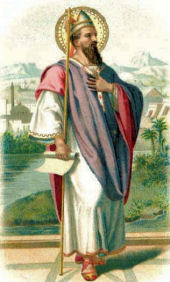
A champion of orthodoxy! He did not die a martyr, but his life was martyrdom in the truest sense. Athanasius was the Church's greatest hero in the battle against Arianism (a heresy that denied Christ's divinity). Even as a young deacon at the Council of Nicea (325), he was recognized as "Arius' ablest enemy" and the foremost defender of the Church's faith. After the death of his bishop (328), "the entire Catholic congregation with one accord, as one soul and body, voiced the wish of the dying bishop Alexander that Athanasius should succeed him. Everyone esteemed him as a virtuous, holy man, an ascetic, a true bishop."
There followed fifty years of constant conflict. Under five emperors and by exile on five different occasions, he gave testimony to the truth of the Catholic position. His allegiance to the Church never wavered, his courage never weakened. As consolation in the face of horrendous calumnies and cruel persecution, Athanasius looked to the unwavering love of his Catholic people. Even time brought no mitigation in Arian hatred. For five years he hid in a deep, dry cistern to be safe from their raging wrath and their attempts to assassinate him. The place was known only to one trusted friend who secretly supplied necessary food.
That Athanasius enjoyed God's special protection should have been obvious to all. On one occasion when the emperor's assassins were pursuing him, Athanasius ordered the ship on which he was fleeing to double-back and sail upstream so that he might meet and by-pass his persecutors. Not recognizing the boat upon meeting in semi-darkness, they naively asked whether the ship carrying Athanasius was still far ahead. Calmly and truthfully Athanasius himself called back, "He is not far from here." So his persecutors kept sailing on in the same direction, allowing the saint to complete his escape.
Preserved by divine Providence through a lifetime of trial and danger, he finally died in his own quarters at Alexandria during the reign of the Emperor Valens (373). Athanasius enriched Christian literature with many important works, some pointed toward piety and edification, others polemical and dogmatic in nature. He ruled the Church of Alexandria for forty-six years.
Excerpted from The Church's Year of Grace, Pius Parsch
Symbols: open book; two columns; boat on the Nile; equilateral triangle; open book between two Greek Doric columns; archbishop's pallium; scroll with quotation from his writings.
Often Portrayed As: Bishop arguing with a pagan; bishop holding an open book; bishop standing over a defeated heretic.
Things to Do:

Also known as
Profile
Studied the classics and theology in Alexandria, Egypt. Deacon, secretary, and student of bishop Alexander of Alexandria. Attended the Council of Nicea in 325 where he fought for the defeat of Arianism and acceptance of the divinity of Jesus. Formulated the doctrine of homo-ousianism which says that Christ is the same substance as the Father; Arianism taught that Christ was different from and a creation of the Father, a creature and not part of God. Bishop of Alexandria c.328; he served for 46 years. When the dispute over Arianism spilled over from theology to politics, Athanasius got exiled five times, spending more than a third of his episcopate in exile. Biographer of Saint Anthony the Abbot and Saint Potamon of Heraclea. Confessor of the faith and Doctor of the Church, he fought for the acceptance of the Nicene Creed.
Born
Writings
Additional Information
Saint Athanasius, Bishop and Doctor of the Church
They did not stop teaching and proclaiming the Messiah. (Acts 5:42)
In 2011, Italian scientists announced a new finding about the Shroud of Turin, which many have claimed to be Christ’s burial cloth. The scientists stated that the image on the shroud, which resembled a crucified man, was not painted on. So how did it get there? They tried to produce a similar effect on another piece of cloth using lasers. They succeeded only partially, speculating that at least thirty-four thousand billion watts of energy would be needed to produce such an image.
That would make sense if the man on the shroud had really been raised from the dead—for the power of God is certainly greater than anything man-made!
The scribe Gamaliel may have sensed this power when he heard the preaching of the apostles. Why didn’t he simply join the rest of the Sanhedrin in condemning them? He was obviously trying to be objective: If these men were telling the truth, it would be of no use to try to stop them. Indeed, this small group of disciples couldn’t have had the impact they were having without some powerful assistance!
Both the story of the shroud and Gamaliel’s reasoning tell us that Christianity is more than just a set of ideas. It is “the power of God for the salvation of everyone who believes” (Romans 1:16). There is a dynamic force in the message of salvation that can reach into hearts and lives and change people from the inside out—you as well as the people in your life who don’t yet believe in Christ!
So don’t shortchange yourself—or God, for that matter—by thinking that only extra-holy people can be effective witnesses for Christ. If you can find just one opportunity today to share something about your faith, you will be making a difference. It’s not about you anyway; it’s about Jesus and his power! Surely you can rely on him as you share your story. And when you do, know that it’s not just you speaking. The Holy Spirit is there, in your words, adding his grace to your witness.
“Lord, I rejoice that your Spirit is alive in me. May he shine through me today, and may I be courageous in bearing witness to you in all that I say and do.”
Psalm 27:1, 4, 13-14; John 6:1-15
Daily Marriage Tip for May 2, 2014:
May is traditionally a month dedicated to the Blessed Mother. Consider praying a rosary today, or even just a decade, and entrusting your spouse and family to Mary’s maternal care.
Disclaimer: Opinions posted on Free Republic are those of the individual posters and do not necessarily represent the opinion of Free Republic or its management. All materials posted herein are protected by copyright law and the exemption for fair use of copyrighted works.